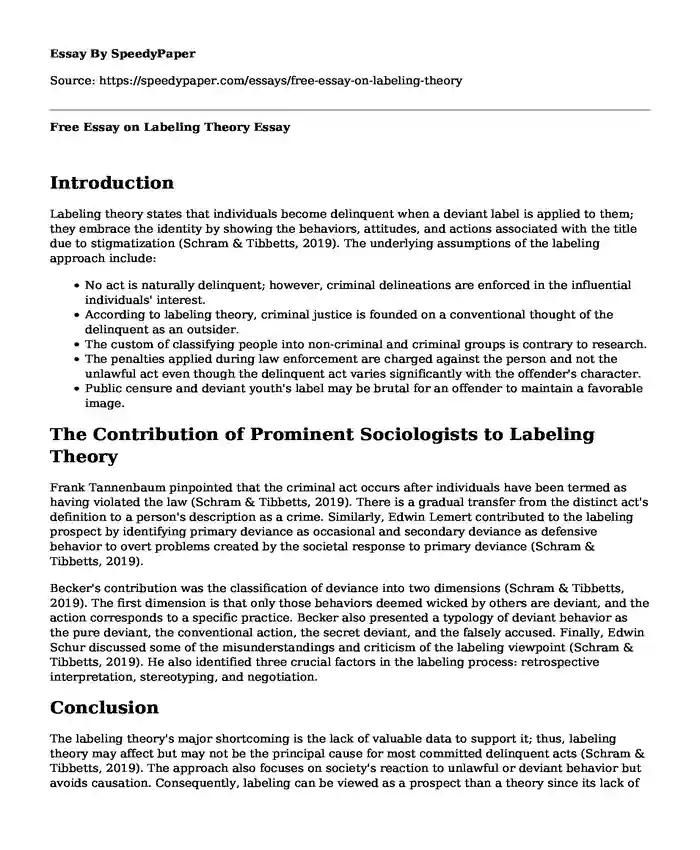
| Type of paper: | Essay |
| Categories: | Psychology Sociology |
| Pages: | 2 |
| Wordcount: | 409 words |
Introduction
Labeling theory states that individuals become delinquent when a deviant label is applied to them; they embrace the identity by showing the behaviors, attitudes, and actions associated with the title due to stigmatization (Schram & Tibbetts, 2019). The underlying assumptions of the labeling approach include:
- No act is naturally delinquent; however, criminal delineations are enforced in the influential individuals' interest.
- According to labeling theory, criminal justice is founded on a conventional thought of the delinquent as an outsider.
- The custom of classifying people into non-criminal and criminal groups is contrary to research.
- The penalties applied during law enforcement are charged against the person and not the unlawful act even though the delinquent act varies significantly with the offender's character.
- Public censure and deviant youth's label may be brutal for an offender to maintain a favorable image.
The Contribution of Prominent Sociologists to Labeling Theory
Frank Tannenbaum pinpointed that the criminal act occurs after individuals have been termed as having violated the law (Schram & Tibbetts, 2019). There is a gradual transfer from the distinct act's definition to a person's description as a crime. Similarly, Edwin Lemert contributed to the labeling prospect by identifying primary deviance as occasional and secondary deviance as defensive behavior to overt problems created by the societal response to primary deviance (Schram & Tibbetts, 2019).
Becker's contribution was the classification of deviance into two dimensions (Schram & Tibbetts, 2019). The first dimension is that only those behaviors deemed wicked by others are deviant, and the action corresponds to a specific practice. Becker also presented a typology of deviant behavior as the pure deviant, the conventional action, the secret deviant, and the falsely accused. Finally, Edwin Schur discussed some of the misunderstandings and criticism of the labeling viewpoint (Schram & Tibbetts, 2019). He also identified three crucial factors in the labeling process: retrospective interpretation, stereotyping, and negotiation.
Conclusion
The labeling theory's major shortcoming is the lack of valuable data to support it; thus, labeling theory may affect but may not be the principal cause for most committed delinquent acts (Schram & Tibbetts, 2019). The approach also focuses on society's reaction to unlawful or deviant behavior but avoids causation. Consequently, labeling can be viewed as a prospect than a theory since its lack of exclusive focus on the act of social labeling.
References
Schram, P. J., & Tibbetts, S. G. (2019). Introduction to criminology: Why do they do it?. SAGE Publications, Incorporated.
https://www.amazon.com/Introduction-Criminology-Why-Do-They/dp/1544375735.
Cite this page
Free Essay on Labeling Theory. (2023, Dec 12). Retrieved from https://speedypaper.com/essays/free-essay-on-labeling-theory
Request Removal
If you are the original author of this essay and no longer wish to have it published on the SpeedyPaper website, please click below to request its removal:
- Free Essay Answering Why You Shouldn't Steal Motor Vehicles
- Stress in My Life. Personal Essay Example for Students.
- Essay Sample on The Star Movie Analysis
- Essay Sample on the Relationship Between CSR and CSP
- Essay Sample on Process Perspective - Reinforcement Theory
- Discuss a Quote and Political Issues: What Does The Quote Mean? Essay Example
- Bullying vs Conflict: Exploring the Difference
Popular categories




